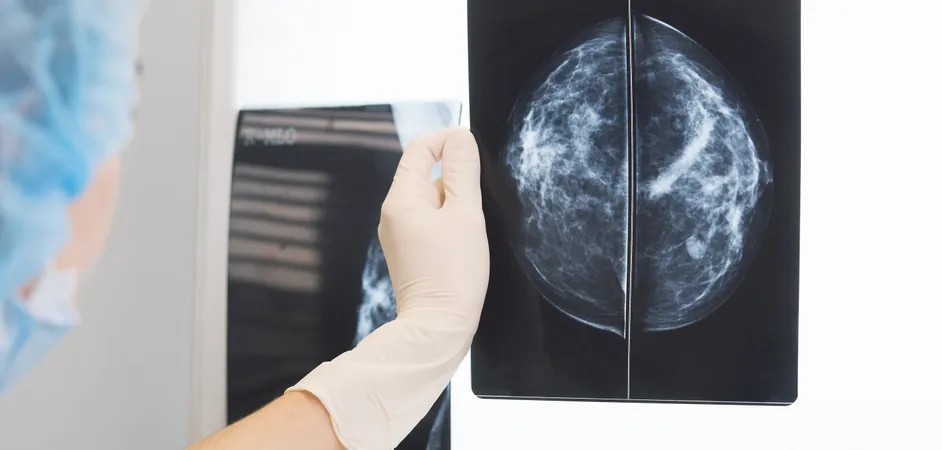
New Hope for Intermediate-Risk Breast Cancer Patients: Mastectomy Without Radiation Might Be Safe!
2024-12-16
Author: Noah
Groundbreaking Revelation at SABCS
In a groundbreaking revelation at the San Antonio Breast Cancer Symposium (SABCS), researchers announced that many patients with intermediate-risk breast cancer may safely skip chest wall irradiation (CWI) following mastectomy. These findings stem from the BIG 2-04 MRC SUPREMO clinical trial, which scrutinized treatment effects on survival rates in these patients.
Debate on Post-Mastectomy CWI
Professor Ian Kunkler from the University of Edinburgh, who presented the study, highlighted the long-standing debate regarding the necessity of post-mastectomy CWI, especially for patients with fewer than four positive axillary lymph nodes. Typically, CWI is the standard treatment for early-stage breast cancer patients with multiple positive lymph nodes. However, for those categorized as intermediate-risk—defined as having one to three positive lymph nodes or exhibiting other concerning cancer traits—it has been unclear whether radiation is essential.
Details of the BIG 2-04 MRC SUPREMO Study
To shed light on this matter, the multi-national BIG 2-04 MRC SUPREMO study included 1,607 participants who were rigorously selected based on criteria such as tumor size (up to 50 mm) and lymph node status. Out of these, 808 were assigned to receive CWI, while 799 omitted it, both groups also undergoing standardized axillary node clearance and systemic therapies.
Significant Findings After 9.6 Years
After a median follow-up period of 9.6 years, results revealed no significant difference in 10-year overall survival rates: 81.4% for the CWI group and 82.0% for the group that did not receive CWI. Although the radiation did decrease the risk of chest wall recurrence by over 50%, the actual difference in recurrence rates was minimal—less than 2%. Kunkler noted that this small reduction was not clinically significant.
Subgroup Analysis
Interestingly, the analysis of subgroups indicated that neither patients with node-negative (N0) disease nor those with one positive lymph node (N1) reaped any survival advantages from CWI. This raises the possibility that many patients with intermediate-risk profiles could safely forego additional radiation.
Implications of the Study
"We've shown that CWI post-mastectomy does not impact 10-year overall survival for intermediate-risk breast cancer patients," emphasized Kunkler. "These findings are crucial for guiding conversations between physicians and patients about their treatment options, as many may not need CWI after all."
Study Limitations
While the study brings hopeful news to the forefront of breast cancer treatment, it is important to acknowledge certain limitations such as the low representation of patients with larger tumors and node-negative disease (pT3, N0).
Funding and Future Research
This research, funded by prominent organizations including the Medical Research Council and several cancer research institutes, has the potential to reshape treatment strategies and enhance patient quality of life by reducing unnecessary procedures.
Conclusion
Stay tuned for more updates as this research unfolds, offering new pathways and hope for breast cancer fight!



 Brasil (PT)
Brasil (PT)
 Canada (EN)
Canada (EN)
 Chile (ES)
Chile (ES)
 Česko (CS)
Česko (CS)
 대한민국 (KO)
대한민국 (KO)
 España (ES)
España (ES)
 France (FR)
France (FR)
 Hong Kong (EN)
Hong Kong (EN)
 Italia (IT)
Italia (IT)
 日本 (JA)
日本 (JA)
 Magyarország (HU)
Magyarország (HU)
 Norge (NO)
Norge (NO)
 Polska (PL)
Polska (PL)
 Schweiz (DE)
Schweiz (DE)
 Singapore (EN)
Singapore (EN)
 Sverige (SV)
Sverige (SV)
 Suomi (FI)
Suomi (FI)
 Türkiye (TR)
Türkiye (TR)
 الإمارات العربية المتحدة (AR)
الإمارات العربية المتحدة (AR)